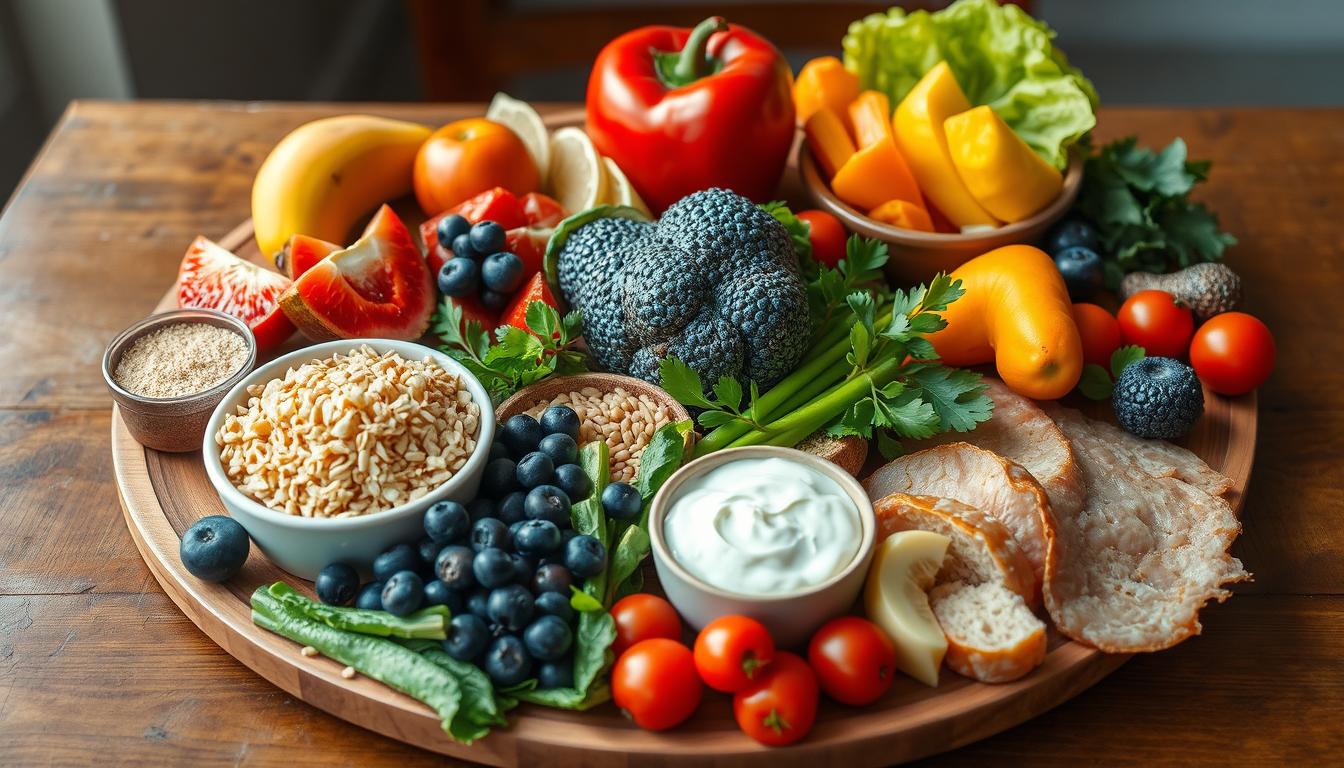
Introduction
“What is a balanced diet and how can we achieve it?” This question arises often when discussing healthy living. A balanced diet is one that provides all the essential nutrients your body needs to function properly, including proteins, carbohydrates, healthy fats, vitamins, and minerals.
In this article, we will explore the importance of a balanced diet, how to implement it in daily life, and review the latest medical studies supporting its role in improving health and preventing chronic diseases.
Understanding the Concept of a Balanced Diet
A balanced diet is the foundation of good health. It ensures your body gets the right amount of nutrients, enabling you to maintain energy, build and repair tissues, and support your immune system.
Unlike regular eating habits, which may lack nutritional value, a balanced diet provides complete nourishment. The goal is to consume the right types of food in appropriate proportions to meet your body’s needs.

🔑 Key Points
- A balanced diet includes all essential nutrients the body needs.
- It consists of proteins, carbohydrates, healthy fats, vitamins, minerals, and fiber.
- Choosing healthy foods and preparing balanced meals are critical steps toward wellness.
- A well-balanced diet supports weight management, strong immunity, and mental health.
- Proper planning and organization are essential for maintaining this dietary lifestyle.
What Makes a Diet “Balanced”?
A balanced diet differs from a typical diet by ensuring all macronutrients and micronutrients are included. This means:
- Proteins help build and repair tissues.
- Carbohydrates are the body’s main energy source.
- Healthy fats enhance vitamin absorption and support brain function.
- Vitamins and minerals regulate important biological processes.
- Fiber improves digestion and reduces the risk of diseases like diabetes and heart disease.
📊 Nutrient Functions Table
| Nutrient | Function | Food Sources |
|---|---|---|
| Proteins | Build and repair body tissues | Meat, fish, eggs |
| Carbohydrates | Provide energy | Whole grains, fruits, vegetables |
| Healthy fats | Aid vitamin absorption, hormone balance | Fish, nuts, seeds |
| Vitamins | Regulate body functions | Fruits, vegetables, whole grains |
| Minerals & Fiber | Support overall health and digestion | Legumes, fruits, vegetables |
🧠 Why Is Nutritional Balance Important?
Eating a balanced diet ensures your body can:
- Function optimally on a cellular level.
- Maintain a healthy weight and metabolism.
- Strengthen the immune system, helping prevent illnesses.
- Improve mental clarity, focus, and mood stability.
📚 According to a recent study published in The Lancet (2023), poor diet contributes to 1 in 5 deaths globally. Balanced eating patterns such as the Mediterranean diet have been linked to lower risks of heart disease, obesity, and cancer (Harvard School of Public Health, 2024).

🌿 Components of a Healthy Balanced Diet
Here is an expanded look at the key components:
| Component | Role in the Body | Common Sources |
|---|---|---|
| Proteins | Muscle and tissue repair | Chicken, tofu, legumes |
| Complex Carbohydrates | Energy provision | Brown rice, oats, sweet potatoes |
| Healthy Fats | Support brain and heart health | Olive oil, avocados, fatty fish |
| Vitamins (A, B, C, D, E, K) | Metabolism, vision, immunity | Berries, leafy greens, citrus fruits |
| Minerals (Iron, Zinc, Magnesium) | Enzyme function, oxygen transport | Nuts, seeds, green vegetables |
| Fiber | Promotes digestion and reduces cholesterol | Whole grains, beans, apples |
🥦 How to Apply a Balanced Diet in Daily Life
Here are practical tips to make balanced eating part of your lifestyle:
- Include diverse food groups in every meal.
- Opt for natural whole foods over processed ones.
- Reduce sugar, sodium, and trans fats.
- Cook meals at home to control ingredients and portions.
- Drink plenty of water and limit sugary drinks.
- Plan weekly menus that include protein-rich foods, fiber, and healthy fats.
📌 Sample Balanced Meal Plan
| Meal | Food Choices |
|---|---|
| Breakfast | Oatmeal with berries, nuts, and a boiled egg |
| Lunch | Grilled chicken, quinoa, steamed broccoli, olive oil dressing |
| Snack | Greek yogurt with honey and sliced almonds |
| Dinner | Baked salmon, sweet potatoes, green beans, and a side salad |
⚖️ Benefits of a Balanced Diet
Maintaining a balanced diet offers numerous benefits:
- Improves metabolism and promotes weight loss.
- Reduces the risk of chronic diseases such as heart disease, diabetes, and cancer.
- Boosts immunity and increases lifespan.
- Enhances mood, concentration, and mental clarity.
- Supports healthy skin, hair, and digestion.
🧪 Backed by Science: What Studies Say
- A 2024 meta-analysis published in the British Medical Journal showed that diets rich in whole foods and plant-based nutrients reduce the risk of cardiovascular disease by up to 30%.
- The World Health Organization (WHO) recommends a daily intake of at least 400g of fruits and vegetables for optimal health.
- Wikipedia states that balanced diets are critical for both physical and mental development, especially in children and the elderly.
✅ Conclusion
A balanced diet is not just a trend—it’s a long-term commitment to your health. It delivers essential nutrients your body needs to thrive, reduces the risk of chronic illness, and enhances overall well-being.
By including proteins, carbohydrates, healthy fats, vitamins, minerals, and fiber, you provide your body with the fuel it needs to perform at its best. With a bit of planning and discipline, incorporating a balanced diet into your daily routine is entirely achievable.
📌 FAQs (Frequently Asked Questions)
❓ What is a balanced diet?
A balanced diet includes all essential food groups: proteins, carbohydrates, fats, vitamins, minerals, and fiber.
❓ How does a balanced diet differ from regular eating?
Regular eating may lack nutritional value, while a balanced diet ensures all nutrients are consumed in the right proportions.
❓ Why is nutritional balance important?
It maintains physical and mental health, supports immune function, and prevents diseases.
❓ What are the core elements of a balanced diet?
Proteins, healthy fats, complex carbs, vitamins, minerals, and dietary fiber.
❓ How can I start eating a balanced diet?
Choose whole foods, prepare diverse meals, and avoid processed or sugary items.
🧾 References
- Harvard T.H. Chan School of Public Health – Nutrition Source
- Wikipedia – Balanced Diet
- The Lancet, 2023. “Global Dietary Risk Analysis”
- British Medical Journal, 2024. “Plant-Based Nutrition and Cardiovascular Health”
- World Health Organization – Diet Recommendations






